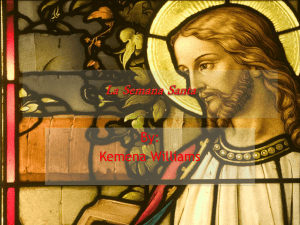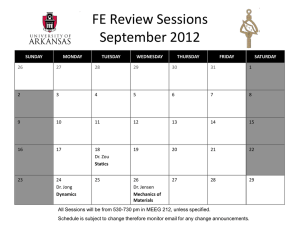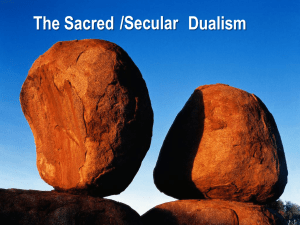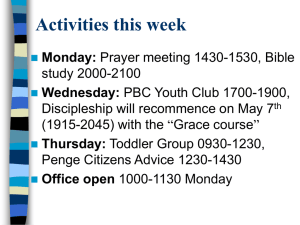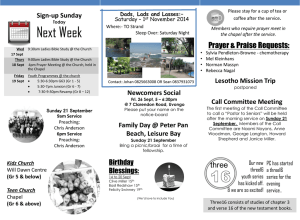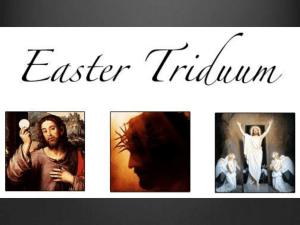The.Liturgical.Year.2010
advertisement
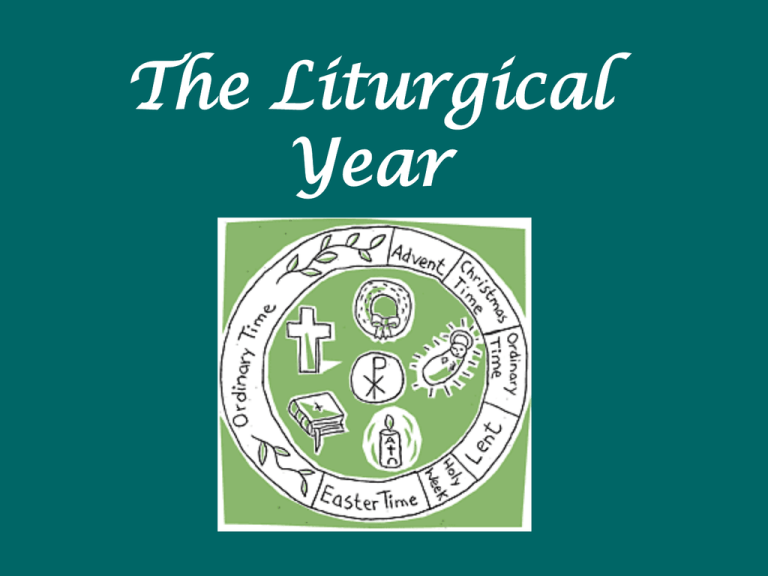
The Liturgical Year Christ’s saving work is celebrated in sacred memory by the Church on fixed days throughout the year. Each week on SUNDAY, the day called the Lord’s Day, the Church commemorates the Lord’s resurrection. Once a year at EASTER the church honors this resurrection and passion with the utmost solemnity. General Norms for the Liturgical Year and the Calendar http://www.scborromeo.org/litcal.htm In fact through the yearly cycle the Church unfolds the entire mystery of Christ and keeps the anniversaries of the saints. THE LITURGICAL DAY Each day is made holy through the liturgical celebrations of the people of God, especially through the eucharistic sacrifice and the divine office. The liturgical day runs from midnight to midnight, but the observance of Sunday and solemnities begins with the evening of the preceding day (the “vigil”). Vigils Lauds Terce Sisters of Santa Rita Abbey singing the Liturgy of the Hours Sext The Liturgy of the Hours None Vespers Compline SUNDAY "The Church celebrates the paschal mystery on the first day of the week, known as the Lord’s Day or Sunday. This follows a tradition handed down from the apostles and having its origin from the day of Christ’s resurrection. Thus Sunday must be ranked as the first holy day of all." THE YEARLY CYCLE "By means of the yearly cycle the Church celebrates the whole mystery of Christ, from His Incarnation until the day of Pentecost and the expectation of His coming again." Sundays are along the outer circle 1st Sunday of Advent Each “spoke” represents one week -- Great feasts of the Church are in capital letters -- Memorials of saints are in upper and lowercase Colors change with each liturgical season ADVENT Advent Wreath Twofold character: (1) as a season to prepare for Christmas when Christ’s First Coming to us is remembered (2) as a season when that remembrance directs the minds and heart to await Christ’s Second Coming at the end of time. Advent is thus a period for devout and joyful expectation. Advent Calendars Advent begins with evening prayer of the Sunday vigil falling on or closest to 30 November and ends before evening prayer on the vigil of Christmas. The weekdays from December 17 - 24 prepare us more directly for the Lord’s birth by evoking salvation history. Each Mass includes one of the “O Antiphons” . . . . 7 ancient prayers of praise and longing: The Jesse O Wisdom Tree O Lord O Root of Jesse O Key of David O Daystar O Desired One O Emmanuel CHRISTMAS SEASON: Next to the yearly celebration of the paschal mystery (Easter), the Church holds most sacred the memorial of Christ’s birth and early manifestations. This is the purpose of the Christmas Season. The Christmas season runs from evening prayer on Christmas Eve (the Vigil) . . . . . .to the Sunday of The Baptism of the Lord . . . .through the Feast of the Epiphany CHRISTMAS SEASON Christmas Creche LENT is a preparation for the celebration of Easter. Lent disposes catechumens and the faithful to celebrate the paschal mystery . . . - through stages of Christian initiation (catechumens) - through reminders of baptism (faithful) and through penitential practices. Lent runs from Ash Wednesday through Palm Sunday & HOLY WEEK but excludes Sundays. Ashes Prayer Fasting Hot Cross Buns Almsgiving Soup & Sacrifice Meatless Fridays Palms The EASTER TRIDUUM of the Passion and Resurrection of Christ is the culmination of the entire liturgical year. (Triduum = “the 3 days”) HOLY THURSDAY Mass of the Lord’s Supper GOOD FRIDAY Passion of the Lord HOLY SATURDAY EASTER SUNDAY Easter Sunday Easter Vigil Easter Season The solemnity of EASTER has the same kind of preeminence in the liturgical year that Sunday has in the week. THE TRIDUUM The triduum begins with the evening Mass of the Lord’s Supper on HOLY THURSDAY . . . continues through GOOD FRIDAY with the commemoration of the Lord’s Passion . . . and reaches its high point in the THE EASTER VIGIL this celebration of the holy night when Christ rose from the dead, ranks as the “mother of all vigils.” The Triduum closes with evening prayer on Easter Sunday EASTER SEASON: The fifty (50) days from Easter to the Ascension to Pentecost are celebrated in joyful exultation as one feast day, or better as one “Great Sunday.” ORDINARY TIME: Apart from those seasons having their own distinctive character, 33 or 34 weeks remain in the yearly cycle that do not celebrate a specific aspect of the mystery of Christ. Rather, they are devoted to the mystery of Christ in all its aspects. This 2-part period is known as "Ordinary Time." The Wedding at Cana “I am the Vine, you are the Branches” The loaves & the fishes The last Sunday of the Liturgical Year is the Feast of Christ the King LITURGICAL COLORS VIOLET - Expectation, Purification, or Penance. (Advent & Lent) Optional: ROSE - Joy, Rejoicing, Praise -- in the midst of Advent & Lent Gaudete Sunday, 3rd Sunday in Advent Laetare Sunday, 4th Sunday in Lent WHITE (OR GOLD) - Joy and Triumph. (Triduum, Easter, Christmas, as well as Holy Days and certain feast days throughout the year, e.g. feasts of Mary.) RED - Royalty, Fire, and Martyrdom. (Pentecost, Palm/Passion Sunday, Good Friday, Triumph of the Cross, feast days of martyrs) GREEN - A sign of Life and Growth. (Ordinary Time) LITURGICAL CYCLE OF SCRIPTURE READINGS For Sundays and other special days throughout the church year, there are three sets of readings assigned for the day. These readings are assigned to Liturgical Years A, B, and C. Years which are evenly divisible by 3 are assigned year C, such as 2010. Year A (2011) follows year C, Year B (2012) follows Year A, and Year C (2013) follows Year B. The Liturgical Years start on the first Sunday of Advent of the previous calendar year, so the first Sunday of Advent last November (Nov 29, 2009) was the start of our current Liturgical Year (2010), Year C. We are now in Liturgical Year 2010, Year C, Weekly Cycle II Sunday Nov 28, 2010 will begin Liturgical Year 2011: Year A, Weekly Cycle I Each Sunday Mass has three scripture readings: 1st = Old Testament 2nd = New Testament letters or Revelation 3rd = from the Gospels Year A: the Gospel of Matthew Year B: the Gospel of Mark Year C: the Gospel of Luke Year A Year B The Gospel of John is used in all 3 Sunday Cycles Year C All 3 Cycles -- 1st & 3rd readings are linked in meaning or context -- 2nd is semi-continuous from Sunday to Sunday -- RESPONSORIAL PSALM sung or recited after 1st reading -- The Gospel Acclamation (Alleluia verse) is sung by the whole congregation before the Gospel . . . But no Alleluia's sung during Lent & Triduum, until the Easter Vigil. For weekdays in ordinary time and other special days throughout the church year: There is a 2-year cycle with 1st reading, psalm, & Gospel Liturgical Cycle I : odd years Liturgical Cycle II : even years The weekday Liturgical Cycles start on the first Sunday of Advent of the previous year. We’ve been in Weekly Cycle II (of Church Year 2010) . . . the upcoming Advent, starting Nov 28, 2010 will begin Weekly Cycle I (of Church Year 2011) FEASTS, MEMORIALS, COMMEMORATIONS AND SOLEMNITIES These are days which the Church has set aside as having special meaning; there are several types of celebrations. -- events in the life of Christ -- days dedicated to a particular saint -- feasts of Mary (under her different “titles” of praise) The Presentation of the Lord Feb 2 Our Lady of the Rosary Oct 7 The Annunciation Mar 25 Our Mother of Sorrows Sep 15 Our Lady of Guadalupe Dec 12 Holy Days of Obligation (in the United States) Jan 1= Solemnity of Mary Mother of God Ascension of the Lord (moveable date based on Easter) Aug 15 = Assumption of the Blessed Virgin Nov 1 = All Saints Day Dec 8 = Immaculate Conception Dec 25 = Christmas Easter & Pentecost are always on Sundays and have moveable dates DAYS OF FAST (Ash Wednesday & Good Friday) ABSTINENCE (Ash Wednesday & Lenten Friday's) Fasting is restricting eating to one full meal and two lighter meals in the course of a single day, and prohibits eating between meals. (For all adults who have not yet reached age 60. Pregnant women & the sick are not obligated.) Abstinence is refraining from eating meat. (for all who have completed their 14th year) "Paschal Fast" = from Mass of Lord's Supper on Holy Thursday to Easter Vigil To find daily readings: U.S. Conference of Catholic Bishops site READINGS AND PSALMS OF THE MONTH • Test of Reading • Audio of Reading • Video of short reflection • Daily Podcast http://www.nccbuscc.org/nab/index.htm To learn more about saints, feast days: The Catholic Encyclopedia Online / New Advent website www.newadvent.org/cathen/ “Saint of the Day” www.americancatholic.org/features/saintofday/ To find out liturgical year information about any date, including links to the saint of the day: The Catholic Calendar Page http://www.easterbrooks.com/personal/calendar/ The Liturgical Year Advent Wreath Ash Wednesday Holy Thursday Jesse Tree (Advent) Pretzel (Lent) Christmas manger Hot cross buns (Lent) Holy Thursday / Mass of the Lord’s Supper Epiphany Star Baptism of the Lord Palm Sunday The TRIDUUM Pelican ≈ Jesus Good Friday Easter Vigil “By his wounds you are healed” Easter Triumphant Lamb Jesus ≈ Lamb of God Phoenix ≈ Jesus Pentecost “Resurrection from the ashes” Trinity Sunday Ordinary Time Chi Rho ≈ Christ Feasts of Mary Lily ≈ virgin

